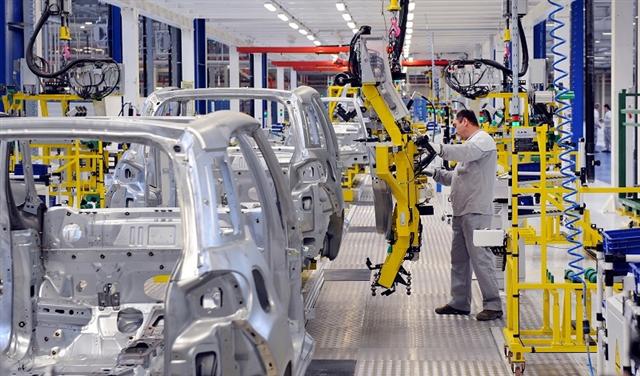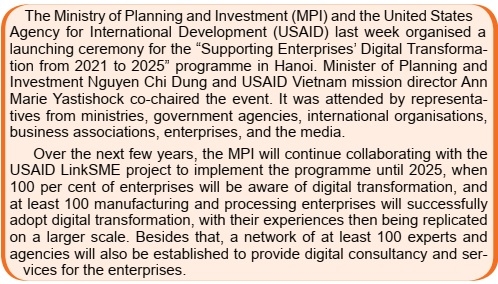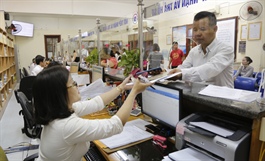Accepting new tech a key to advancement
Accepting new tech a key to advancement
Supporting enterprises in applying digital technology amid the surge of the Fourth Industrial Revolution and the health crisis will be among the keys for Vietnam to achieve sustainable development and high growth.

Accepting new tech a key to advancement - illustration photo
|
According to a report on the issue recently released by the United Nations Development Programme (UNDP), Vietnam needs to have proper policies and solutions for itself and for enterprises to adapt to Industry 4.0. This will create massive opportunities for the country to hit higher growth and achieve sustainable development.
However, the report also stated, “In the transition to its new development stage, Vietnam faces some key risks and challenges, including economic uncertainty, re-shoring manufacturing back towards developed economies, trade wars accompanying rising nationalism, the effects of climate change, and Industry 4.0-induced changes in global value chains, employment, and human development.”
For example, the UNDP pointed out that Vietnam must better prepare for, and adapt to, the impact of Industry 4.0 on drivers of growth and job creation. Accelerating this offers both opportunities and risks in terms of future employment creation, as Vietnam embarks on new growth pathways. It is anticipated that automation and AI will displace jobs in several sectors that have been driving Vietnam’s growth.
A report by the International Labour Organization on the future of jobs at risk of automation suggests 70 per cent of jobs in Vietnam are at risk of such a change. Sectors with a very high proportion of jobs at risk of automation include agriculture, forestry, and fisheries (83.3 per cent at risk), manufacturing (74.4 per cent), food and beverages (68 per cent), garments (85 per cent), electronics (75 per cent), wholesale, retail, and repair of motor vehicles (84.1 per cent).
A 2018 report from Oxford Economics and Cisco on the impact of AI on ASEAN jobs forecasted that 7.5 million jobs would be replaced by AI in the next 10 years in Vietnam. At the same time, millions of new jobs with different functions would be created through what the report called the “income effect”.
Thus, the net job loss is about 1.7 million, 90 per cent of which would be in the agricultural sector.
Caitlin Wiesen, UNDP resident representative in Vietnam, said that whether Vietnam will avoid the key risks “depends very much on how the country’s private enterprises, which currently consist of mainly micro, small, and medium-sized enterprises, will be able to grow both in terms size, their productivity and competitiveness including through growth in entrepreneurship, innovative applications of Industry 4.0 and green technologies for creating higher value and greener jobs.”
|
Aware of these issues, in September the government announced Resolution No.136/NQ-CP on sustainable development to 2030, including Vietnam’s very own 17 Sustainable Development Goals.
One of the key points is that the government underlined the major role of science and technology in Vietnam’s sustainable development.
“Science and technology, especially Industry 4.0 and digital transformation, shall be the foundation and driver of sustainable development in Vietnam. Modern, clean, and eco-friendly technology needs to be prioritised in manufacturing industries,” reads the resolution.
In June the Politburo enacted Conclusion No.77-KL/TW on overcoming impacts of COVID-19 for national economic recovery and development, underlining the need for Vietnam to develop a digital government, economy, and society with renovations and applications of science and technology.
“Resources are gathered to develop a number of shared technological platforms and national key database systems,” states the conclusion. “It is necessary to boost the formulation of policy frameworks and complete legal frameworks for new business models and for digital transformation.”
Also in June, Prime Minister Nguyen Xuan Phuc approved a national programme on digital transformation until 2025, which is a big addition to Vietnam showing its strong determination to become a digital economy with sustainable development.
“The government will create new policies to stand ready to accept and pilot new technological solutions controllably. There must be a culture of accepting and piloting new things,” stated PM Phuc. “Vietnam’s digital tech businesses are key developers of infrastructure, platforms, services, and solutions of digital transformation. They will have to master core technology and then expand their presence to the global markets.”



























